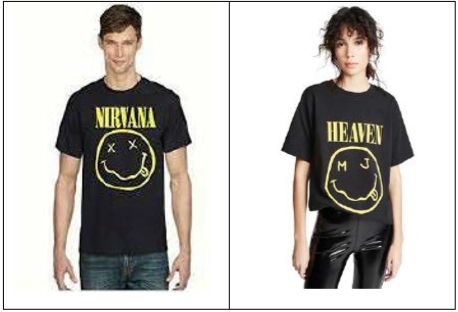Nirvana files new complaint after discovery calls into question whether Kurt Cobain was truly the artist behind the band's highly-recognizable design, with the band's infringement suit against fashion designer Marc Jacobs hanging in the balance.
Hey! Wait! Nirvana's got a new complaint! In its ongoing legal battle over the band's infamous "smiley face" logo, Nirvana LLC is now asking a California federal court to declare that Robert Fisher, a former art director for the band's label, does not own any rights to the design. It's the latest twist in a case with all the trappings of an IP law school exam question that leaves very little to smile about.
The overarching question in the case, involving Nirvana, fashion designer Marc Jacobs International LLC ("Marc Jacobs"), and now graphic designer Robert Fisher, is just who actually created the iconic design – the infamous smile with x's for eyes, and a crooked grin with its tongue hanging out – and, ultimately, who has the right to permit or enforce against its use. It's an issue that has remained hazy in this case, especially because the one person who, according to Nirvana, is best situated to settle the issue has been dead for more than 25 years. Pop culture lore, and the records at the U.S. copyright office, have long held that Kurt Cobain, the band's prolific frontman crafted the design. But Marc Jacobs, and now Fisher, are spinning a different tune.
The case began in 2018 when Nirvana, LLC ("Nirvana"), the corporate entity for the now-defunct grunge band that popularized the "alternative rock" and "grunge" musical genres, sued fashion designer Marc Jacobs after its "Bootleg Redux Grunge" clothing collection which included clothing bearing a design that was virtually identical to Nirvana's recognizable smiley face design, for which Nirvana holds a U.S. Copyright Registration. Additionally, promotional materials for the collection incorporated references to famous Nirvana songs. Nirvana contends that Marc Jacobs intentionally infringed the band's IP to "make the 'Grunge' association with the collection more authentic." Also named in the complaint are Neiman Marcus and Saks 5th Avenue which sold Marc Jacobs' smiley face products in the U.S.
According to the complaint, Nirvana's smiley face logo was first used on a poster advertising the launch of the band's 1991 album "Nevermind." The squiggly-eyed smile with x's for eyes has become an iconic feature on licensed merchandise for the band, including t-shirts, hats, hoodies, bags and other items which, according to Nirvana, have been sold for decades. Nirvana claims that Cobain created the smiley face logo in 1991 and "Nirvana has used that copyright-protected design and logo continuously since [then] to identify its music and licensed merchandise."
Nirvana contends that Marc Jacobs' smiley face design, which replaced the "x" eyes with the letters "m" and "j" and used the word "Heaven" in place of "Nirvana," creates a false impression that the band is associated with the designer. Images of the competing uses, which are shown in the Complaint, are below:

Marc Jacobs moved to dismiss the suit, but a federal court in California ruled that the designs were similar enough that the case should move forward. "[A] review of the images confirms that the allegation as to substantial similarity is sufficient," wrote U.S. District Judge John A. Krondstadt. "It is also noteworthy that the accused products have combined this protectable artwork with other distinctive elements of the Nirvana T-shirt, including the use of yellow lines on black background and a similar type and placement for the text above the image on the clothing," he said.
In its answer and counterclaim, the Marc Jacobs argued that Nirvana cannot prevent its use of the design because a smiley face is a familiar symbol and thus not capable of copyright protection. Marc Jacobs also claimed that Cobain's widow, Courtney Love, whose corporate entity The End of Music, LLC is a part owner of Nirvana LLC, had implicitly acquiesced to the use of the logo by virtue of her participation in the release of the "Bootleg Redux Grunge" collection.
Now, Marc Jacobs claims that that Nirvana has no rights to the design because, contrary to pop-culture history, Cobain is not the creator of the smiley face logo.
In a Motion for Summary Judgment filed in November, Marc Jacobs says that discovery revealed that Cobain was not the creator of the smiley face design, but rather, it was created by Robert Fisher, a former art director for the band's label, Geffen Records, and that Mr. Fisher has never assigned his rights in the design to anyone. Marc Jacobs argues that the U.S. Copyright registration incorrectly credits Cobain as the original author of the design, indicating that the work was produced as a "work made for hire" for Nirvana, Inc. who later assigned the registration to Nirvana, LLC. According to the designer, because the author of the copyright registration is arguably listed incorrectly at the Copyright Office, the registration is faulty and cannot support Nirvana's infringement claim.
To read the full article, click
here.
Originally Published by Haynes Boone, December 2020
The content of this article is intended to provide a general guide to the subject matter. Specialist advice should be sought about your specific circumstances.
